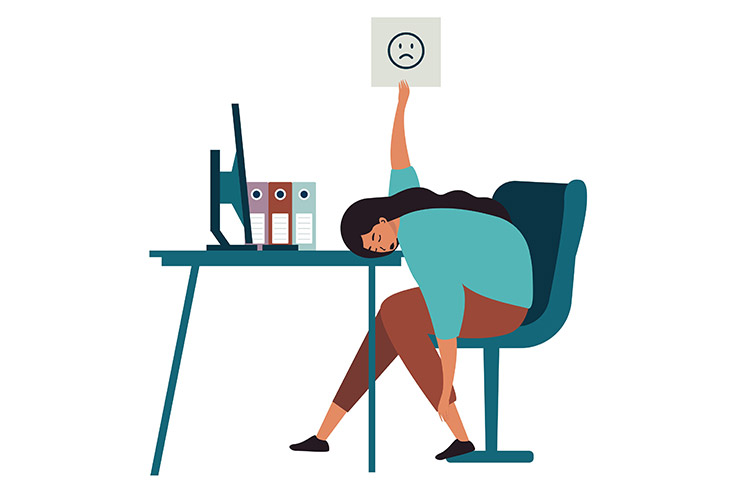
High Functioning Anxiety
High functioning anxiety is a mental health condition in which the affected persons experience the symptoms of an anxiety disorder but appear to function well in social settings, work related tasks, etc.
There is no definition for high functioning anxiety, as it is not an officially recognized condition. High functioning anxiety is not a disorder and is not listed in the Diagnostic and Statistical Manual of Mental Disorders (DSM-5), yet it can prove to be very harmful for one’s health.
People with high functioning anxiety may not seem as though they are struggling externally, but internally, they go through a lot of turmoil and anxiety reactions. Some people may say that they have this condition, however, it can be difficult to diagnose as the characteristics between those with Type A personality and those with high functioning anxiety are quite similar. People with high functioning anxiety, in most cases, tend to have self-esteem issues yet seemingly do well in life. Hence, on the surface, they may appear as though they are growing, flourishing and thriving. But the truth is, they don’t feel as healthy or at peace on the inside. Their anxiety can rise to crippling levels and make them experience intense feelings of impending doom, anxiety, rapid heart-rate, gastrointestinal distress, fear and hopelessness.
Signs of High Functioning Anxiety
Anyone with high functioning anxiety would seem to be your typical overachiever, a charming go-getter, or in simple terms, an incredibly successful person, or whatever you may like to call them. You may think they have it all together, but in reality, their achievements or performances don’t make them feel better. They do negative self-talk and beat themselves up over not living up to their ideals and not being “good enough.”
High functioning anxiety, unlike the classified anxiety disorders, doesn’t produce any severe physical symptoms. When anxiety rises to a peak, people suffering from high functioning anxiety do experience some physical symptoms, yet they aren’t intense enough to restrict daily functioning or for outsiders to notice them. This condition can be compared to generalized anxiety disorder (GAD) given its vague nature, and at the same time, some overlaps can be seen in the symptoms produced by other disorders and high functioning anxiety as well.
The signs and symptoms of high functioning anxiety include:
- Worries and feelings of anxiety, inability to relax
- Overthinking and overanalyzing events, second-guessing recently made decisions
- Anticipatory anxiety before a new event or encounter
- Obsessive fear of failure and negative judgement of others
- Perfectionism: This involves consistent feelings of dissatisfaction with performance at work and other areas
- Workaholism: This involves the need to constantly keep producing output and working constantly, even when at home
- Problems with maintaining a consistent healthy sleep pattern, periodic insomnia
- False optimistic disposition expressed publicly that conflicts with the actual pessimistic thinking patterns
- Difficulty saying no regardless of the difficult demands of the task proposed
- Unconscious nervous habits like hair pulling, biting nails, etc.
- Low self esteem and self confidence
- Unrealistic goals and expectations from self and others
Positive and Negative Characteristics of High Functioning Anxiety
The positive signs of high functioning anxiety, that may make the individual suffering from it appear normal and in fact functioning on an elevated level (hence the term, “high functioning”), are numerous. People with high functioning anxiety are actually able to channel it to achieve success in life, however their anxiety is overwhelmingly crippling and does affect them internally. They appear awkwardly calm in public and are over-achievers in their lives. They have extroverted personalities and are quite helpful and passionate beings. They are often overly organized and keep to-do lists, calendars and schedules and are detail-oriented individuals.
However, the negative characteristics do outweigh the positive qualities. Despite their armour of perfectionism and idealism, they constantly fight crushing feelings of anxiety and the fear of disappointing others, and themselves. They’re persistently burdened with a sense of all-consuming nervousness. They may try to evaluate themselves with their achievements, but in real life, they are simply not doing as well as they seem.
They tend to be people pleasers with a crippling inability to say no, and have a need for being reassured and validated by others all the time. They have overloaded schedules and are busy all the time. As a result, they are physically fatigued and mentally burnt out, and have racing thoughts all the time. They overthink situations. They feel they fall short of their and others expectations all the time and keep comparing themselves to others. They talk a lot and indulge in nervous chatter. They tend to procrastinate, as well and then do a lot of work in short bursts which leads to stress.
Causes
The exact cause of high functioning anxiety cannot be pinpointed, however some risk factors are involved that can lead to the development of this problem. Type A personalities seem to be prone to developing high functioning anxiety as well. The risk factors are as follows:
- Demanding and critical parents
- Shyness during early childhood
- Witnessing traumatic events, or experiencing them
- Childhood abuse
- History of anxiety disorders in the family
- Personal history of depression
- Stressful work or jobs
- Financial and legal problems
- Burn out
The roots of high functioning anxiety can be found in the childhood experiences and personality traits developed during childhood of the person suffering from this condition. They generally don’t respond to external stressors but instead experience symptoms related to internal stressors.
Complications of High Functioning Anxiety and Co-Occurring Disorders
Chronic anxiety leaves intensely negative and long term impact on the health (mental and physical) of the person suffering from it. At the same time, there are many overlaps between other mental illnesses and high functioning anxiety.
Depression co-occurs with high functioning anxiety in most people suffering from the latter. People suffering from high functioning anxiety are also prone to alcohol abuse and substance abuse as an unhealthy way to cope. For the people who have already developed such a condition, the treatment takes place at an addiction treatment facility.
And due to low self esteem and low self confidence, people with high functioning anxiety often show overlaps with eating disorders
Some of the chronic illnesses that can be linked to high functioning anxiety as well, and they are as follows:
- Cardiovascular diseases
- Irritable Bowel Syndrome
- Chronic Obstructive Pulmonary disease
- Asthma
- Stroke
Treatment for High Functioning Anxiety at Incontact
The treatment for high functioning anxiety involves mostly eclectic psychotherapy approaches. This could include cognitive behavioural therapy, systemic therapy, eye movement desensitization and reprocessing therapy, an overall eclectic based approach. The treatment for high functioning anxiety generally tends to pinpoint the roots of this anxiety which typically stems from self deprecating perception of oneself. Through therapy we assist you to develop more awareness of yourself and overall encourage behavioural changes that could be contributing to high functioning anxiety
Medication can also be prescribed for the purpose of reducing anxiety related symptoms. This can include intake of antidepressants i.e selective serotonin reuptake inhibitors, and/or benzodiazepines which is an anti anxiety medication.
At Incontact, we work based on a philosophy that everyone is unique and requires a distinct therapeutic touch to their treatment. This helps us create a plan well suited to your needs.
Submit a Comment
Your email address will not be published. Required fields are marked *
Related reading
What Not to Expect from Therapy: Dispelling Common Misconceptions
24 April, 2025
You finally booked your first therapy session, nerves and hope swirling inside you. Maybe you’ve heard that therapy can work wonders – and it can. In f...
It’s Not Just in Your Head: How Trauma Affects Your Body and How You Can Heal
23 April, 2025
Have you ever noticed aches, fatigue, or tension in your body after a stressful or traumatic experience? If so, you’re not alone. When we think of trauma...
How to Prepare for Your First Therapy Session: A Beginner’s Guide
5 March, 2025
Choosing to begin therapy is a courageous and empowering decision. It signifies your willingness to invest in your mental and emotional well being, it’s ...





